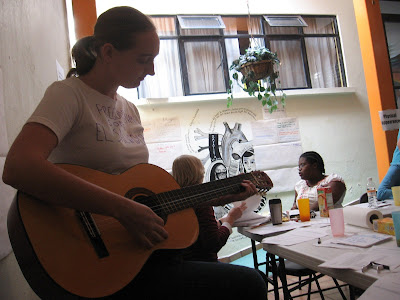If there are two things I learned this week, its that we have to have hope. And that re-entry into the
“We will have to talk about you going down there, I wouldn't be real interested in having one of my daughters in jail!!” he said.
After I emailed my Dad my final project, in an attempt to not have to explain all that we did and learned in our 10-day travel seminar in
In our last few hours of the program, during our Social Change Lab Group, Julie gave us a big warning and very detailed suggestions to help deal with this re-entry concept and the whole “How was Mexico?” question. One typical reaction she talked about that scared me was the “reversion reaction” – where one just closes up and doesn’t talk about their experiences and just falls back into one’s old life as if the past semester had never happened.
After a day filled with final presentations that are intended to educate those at home about  cabeza” (which translates into “head-breaker”, but it is a puzzle), I know she will get people looking closer at the images that make up the history and current situations of El Salvador, and also encourage others to “speak their own truths” as those we met also did. And Kathryn is bound to get her tune parody of School House Rock actually on the School House Rock program – maybe kids will start to learn the real
cabeza” (which translates into “head-breaker”, but it is a puzzle), I know she will get people looking closer at the images that make up the history and current situations of El Salvador, and also encourage others to “speak their own truths” as those we met also did. And Kathryn is bound to get her tune parody of School House Rock actually on the School House Rock program – maybe kids will start to learn the real
All of the speakers we’ve had, families we’ve lived with, the staff and professors at CEMAL, and all of the students – all of them have given me hope that maybe this big concept of “social change” is something we can actually tackle. Yes, I did think I would found out what to do with my life, I thought I’d be fluent in Spanish (ask Megan, I’m not – but the Spanglish is going well), and yeah, I thought maybe we would get the answers and formulas on how to change our world.
But no, believe it or not, there is no cheat sheet for Social Change 101. But in order to make efforts to change our world, we do need hope. And each other.
“If you don’t have hope, you die. And there are a lot of dead people walking around,” said James Cone, a black liberation theologian.
At our closing ceremony at Ann’s house this Friday, we all read a pledge as to what we are going to do once we return home.
“I pledge to not lose hope,” I said.
I pledge to not lose hope that one day maybe Licha will change the church from working within it with Liberation Theology, that I can go to a School of the America protests and have my voice heard and not get arrested as my Dad seems to worry about, and yes, that maybe the Casa Verde phone will one day work better.
My mom told me this would be a radicalizing experience. I thought she was just exaggerating. I believe
As Dan quoted in his final project, “Never doubt that a small group of thoughtful, committed citizens can change the world. Indeed, it is the only thing that ever has.”
In addition to her “Ask me about




